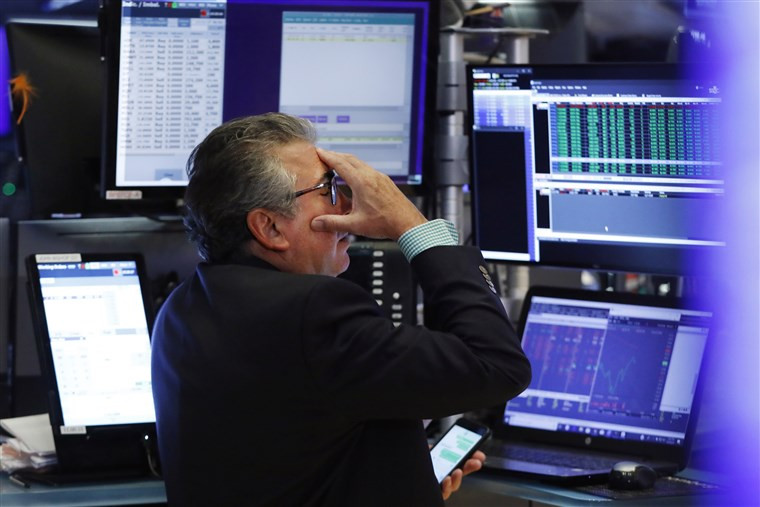
The major US stock indexes plummeted on Wednesday after another round of sales of the large companies in the technology sector, as well as against the background of rather vague news about the release of the coronavirus vaccine on the market.
The Dow Jones Industrial Average was down 0.47% or 130.4 points at the end of yesterday's session, which moved it to 27,901. 98 points.
The S&P 500 index lost 0.84%, or 28.48 points. Its current level is 3.357. 01 points.
The Nasdaq Composite index was the leader of the fall which sank 1.27% or 140.19 points, which forced it to move to 10.910. 28 points.
In addition to the sharp reduction in the value of securities of companies in the technology sector, market participants played back the results of the meeting of the US Federal Reserve, which took place this week. Recall that the regulator decided to switch to a new strategy for targeting inflation. Now the fed's tasks will include keeping the average inflation rate for the reporting period in the region of 2%, while in certain time ranges this level can be exceeded. In addition, it was decided to leave Federal loan rates at an extremely low level from 0% to 0.25% for a very long time, until the end of 2023. The regulator wants to be sure that the country's economy has fully coped with the crisis associated with the coronavirus pandemic.
Aside from the results of the Fed meeting, the statistics that came out on Thursday also pressured market participants which forced them to reconsider their views. The number of new applications for jobless claims in the US decreased but again did not coincide with the initial forecasts, which turned out to be better than actual data. Over the past week, which came to an end on September 12, there were approximately 860,000 new applicants to the employment service. A week earlier, their number in the revised version was 893,000. Initial forecasts estimated the cases to go around 850,000.
A negative trend was also recorded in the sector of new home construction in the US. The total number of construction projects started in 2020 decreased by 5.1% over the last month of the summer. Now their number is equal to 1.416 million in terms of average annual rates.
Meanwhile, the major stock indexes in Asia did not show dynamics on Friday morning while the rest traded multidirectional.
The uncertainty of the future development of the global economy and the movement of economic processes has a very negative impact on the market. However, market participants express their deep hope that the main regulators of the countries will make every effort to provide full support to the recovery of economic growth after the serious crisis that occurred against the background of the coronavirus pandemic.
Japan's Nikkei 225 index was up 0.17%. The level of consumer prices in the country for the last month of summer, excluding the cost of fresh food, decreased by 0.4% compared to the same period last year. Recall that in the previous two summer months, prices remained unchanged. Thus, consumer prices for August slowed by 0.2% on an annualized basis.
China's Shanghai Composite index also rose significantly by 1.4%. The Hong Kong Hang Seng index supported the positive trend and increased 0.5%.
South Korea's Kospi Index rose 0.3%.
Australia's S & P / ASX 200, on the other hand, sank 0.18%.
The negative atmosphere prevails in the European stock markets. Major stock indexes are shrinking as they are weighed down by the growing concerns about the second wave of the COVID-19 pandemic. The tourism sector in the region, which has not yet recovered from the losses it suffered during the first large-scale wave of infection, is particularly seriously affected.
Official statements from the World Health Organization (WHO) indicate that the concern about new outbreaks of the disease is not in vain. According to official data, the transmission of infection in the region is increasing and may reach significant proportions. In order to prevent the second wave of the infection, the WHO recommends that countries re-implement the two-week quarantine measure for those arriving from neighboring countries and regions.
Among the first to suffer from the second wave of infection was Spain, which already experienced a severe shock during the first wave. To prevent the situation from repeating itself, the authorities plan to return restrictive measures on the movement of residents of individual cities starting Friday.
In addition, statistics began to arrive from the UK. Thus, the total volume of retail sales in the country over the last month of summer increased by 0.8%, although this is the smallest increase in the last four months. On an annualized basis, sales were up 2.8%.
Meanwhile, the statistics from the UK showed that retail sales in the country increased by 0.8% over the last month of summer, which was the smallest increase in the last four months. On a year-over-year basis, sales rose by 2.8%.
The general index of large enterprises in the Stoxx Europe 600 region sank 0.12% and moved to the level of 370.7 points.
The UK FTSE 100 Index declined 0.39%. France's CAC 40 index was down 0.43%. Italy's FTSE MIB Index fell slightly by 0.03%. Spain's IBEX index fell more than the rest by 1.16%. The German DAX index was the only one with positive dynamics which increased 0.05%.
 English
English 
 Русский
Русский Bahasa Indonesia
Bahasa Indonesia Bahasa Malay
Bahasa Malay ไทย
ไทย Español
Español Deutsch
Deutsch Български
Български Français
Français Tiếng Việt
Tiếng Việt 中文
中文 বাংলা
বাংলা हिन्दी
हिन्दी Čeština
Čeština Українська
Українська Română
Română

